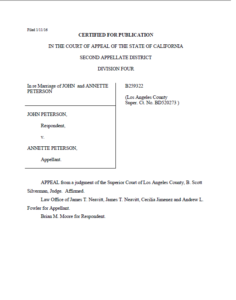Irvine California – Recent Case Law Provides for Unjust Division of Social Security and Pension Benefits
 In a recent case from Los Angeles County, a husband (John) and wife (Annette) divorced. Both parties are attorneys. Annette worked for L.A. County and had a pension benefit through her employment, and John worked in private practice and accrued Social Security benefits through his employment as a mandatory deduction.
In a recent case from Los Angeles County, a husband (John) and wife (Annette) divorced. Both parties are attorneys. Annette worked for L.A. County and had a pension benefit through her employment, and John worked in private practice and accrued Social Security benefits through his employment as a mandatory deduction.
A copy of the case can be found here: Marriage of Peterson.
The parties in the Peterson case agreed how to divide their assets equally, except they could not agree on how to divide their respective retirement benefits. They both acknowledged the state of federal law and California law, which provides the following general rules:
- Social Security benefits are the separate property of the acquiring spouse. (See more below regarding when an ex-spouse may be entitled to derivative benefits of his or her spouse for a marriage of over 10 years).
- California law requires an equal division of retirement benefits (Fam. Code 2550), which are community property, unless the parties agree otherwise.
Here, Annette’s retirement benefits were required to be divided exactly equally under California law and John’s Social Security benefits had to be confirmed to John solely under federal law. (Note: Federal law always preempts state laws). This division doesn’t seem fair, equitable, or just.
Annette requested that despite the state of the law recited above, the family court judge should fashion an “equitable” division of the parties’ respective retirement plans so that each would receive an equal share of the collective benefits. The trial court ruled that it was not permitted to divide retirement benefits in the manner requested by Annette, and the Court of Appeals confirmed. The end result is that John was permitted to retain the entirety of his Social Security benefits and also received half of Annette’s pension!
Annette argued that many other states, including Washington, Arizona, and Louisiana, all Community Property states, carved out exceptions to the strict community property retirement benefit division law by statute or case law. Those states permit family judges to divide retirement benefits equally in certain circumstances. The California Court of Appeal stated that the California legislature has yet to carve out such an exception, and even stated,
“We sympathize with Annette’s situation, and recognize that the result of California’s strict policies on the division of property, intended to protect spouses (see Sec. 2580), did not produce an equitable result in the situation before us. But it is not our role to change or defy California law.”
For more information about joinder of a retirement benefit plan, click here.
When does an ex-spouse receive Social Security Benefits?
The Social Security Administration (SSA) provides information on how an ex-spouse married 10 or more years might be entitled to their former spouse’s SS benefits. Generally, the following rules apply:
If you are divorced, but your marriage lasted 10 years or longer, you can receive benefits on your ex-spouse’s record (even if he or she has remarried) if:
- You are unmarried;
- You are age 62 or older;
- Your ex-spouse is entitled to Social Security retirement or disability benefits and
- The benefit you are entitled to receive based on your own work is less than the benefit you would receive based on your ex-spouse’s work.
The SSA states that if you remarry, you generally cannot collect an ex-spouse’s benefits unless your later marriage ends in death, divorce or annulment.
Click here for a link to the SSA Retirement Planner page.
For more information about dissolution of marriage, divorce and the division of retirement benefits, contact our office today.
